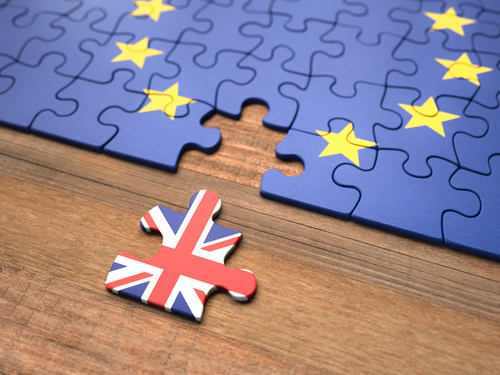
As Brexit unfolded, the packaging and labelling industry experienced a seismic shift in regulations. Manufacturers and distributors scrambled to adapt to new requirements governing product packaging, labelling, and artwork. In this blog, we explore the ways Brexit has impacted the industry so far and look at how businesses are still adapting today. We also look at how you can prepare your business for future regulation changes to ensure you’re staying compliant and ahead of the curve.
Brexit's Impact on Packaging and labelling:
Brexit brought about significant changes in regulations governing product packaging and labelling in the UK. With the UK's departure from the EU, businesses faced a slew of challenges and uncertainty, including navigating customs checks, tariffs, and country-of-origin labelling requirements.
Even now, there is uncertainty surrounding the UKCA and the latest Windsor Framework Regulations which will see the introduction of a ‘UK Only’ label for pharmaceuticals but not medical devices that contain pharmaceutical products like an inhaler. Moreover, the need to comply with UK-specific regulations alongside existing EU standards added complexity to an already intricate regulatory landscape.
Changes in Regulation: With the UK leaving the EU, there have been changes in regulations governing product packaging and labelling. UK-specific regulations now apply, and businesses must ensure compliance with both UK and EU regulations if they are trading in both markets.
Customs and Tariffs: Brexit has introduced customs checks and tariffs for goods moving between the UK and the EU. This has implications for product packaging as businesses may need to include additional information for customs purposes.
Country of Origin labelling: Products manufactured in the UK now require clear labelling to indicate their country of origin. This is important for both domestic and international trade, as it impacts tariffs and trade agreements.
Product Standards and Certification: UK businesses exporting to the EU must comply with EU product standards and certification requirements. This may necessitate changes to packaging and labelling to ensure that products meet EU regulations.
Changes in Import/Export Documentation: Brexit has introduced new documentation requirements for importing and exporting goods between the UK and the EU. This includes changes to paperwork such as customs declarations, which may need to be reflected on product packaging.
Health and Safety Regulations: The UK has the authority to set its own health and safety regulations post-Brexit. This may result in changes to labelling requirements to ensure compliance with UK-specific regulations.
Language Requirements: Products sold in the UK may no longer be required to have labelling in multiple languages as mandated by EU regulations. However, businesses exporting to the EU will still need to comply with EU language requirements.
Packaging Waste Regulations: The UK has its own packaging waste regulations separate from those of the EU. Businesses may need to adjust packaging designs to comply with UK-specific waste management regulations.
Product Marking: The UK has introduced a new UKCA (UK Conformity Assessed) marking to replace the CE marking for certain products sold in Great Britain. This change may require updates to product packaging and labelling to reflect the new marking.
Data Protection and Privacy: Changes in data protection laws post-Brexit may require adjustments to packaging and labelling to ensure compliance with UK data protection regulations, especially regarding the handling of personal data.
These changes are only some of the key areas where Brexit has impacted the labelling, and artwork of products sold and manufactured in the UK and there are still new regulations emerging even now in 2024. For example, the new Windsor Framework Regulations on the requirement to mark products as ‘UK Only’ will commence in January 2025. As a result, it is crucial for businesses operating in the UK market to stay informed about evolving regulations and to be prepared for further changes. If there is one thing that Brexit and its aftereffects has taught us, it’s to be prepared with a system that can handle mass changes with ease.
Adapting to Regulatory Changes with Veraciti™:
Now let’s talk about how to prepare your business for any future regulatory changes that may be on the horizon and could cost your organization a lot of time and money.
Bob Tilling, Kallik’s VP of Global Sales, explains how Veraciti™ can take the stress out of mass labelling and artwork changes. “Amidst the chaos, Veraciti™ has proven to be a reliable partner for businesses seeking to navigate the evolving regulatory environment post-Brexit. Leveraging its cutting-edge technology and expertise, Veraciti™ offers a comprehensive solution to ensure compliance and mitigate risks associated with regulatory changes.”
“Through features like 'Where Used' and Automated Artwork Generation, Veraciti™ empowers companies to make mass changes efficiently while ensuring compliance and accuracy. Additionally, Veraciti™'s label templates and Cascade feature significantly reduce errors and streamline the approval process, ultimately enhancing speed-to-market and reducing costs. With real-time updates, seamless integration supported by AI and 24/7 support from our experts on the Kallik Service Desk, you can navigate regulation changes with complete confidence thanks to Veraciti™.” Bob explains.
Brexit has undoubtedly reshaped the regulatory landscape for the packaging and labelling industry in the UK. However, with the right partner by their side, businesses can navigate these changes with confidence and ease. Veraciti™'s adaptable solutions empower businesses to stay compliant, meet deadlines, and thrive in a post-Brexit world.
Are you struggling to navigate the complexities of post-Brexit regulations? Download our FREE guide on navigating the new Windsor Framework regulations to stay ahead of the curve. Speak to one of our labelling and artwork experts to learn more about how Veraciti™ can help your business thrive in a rapidly changing regulatory environment. Get in touch today at enquiries@kallik.com or call +44 (0) 1827 318100.
